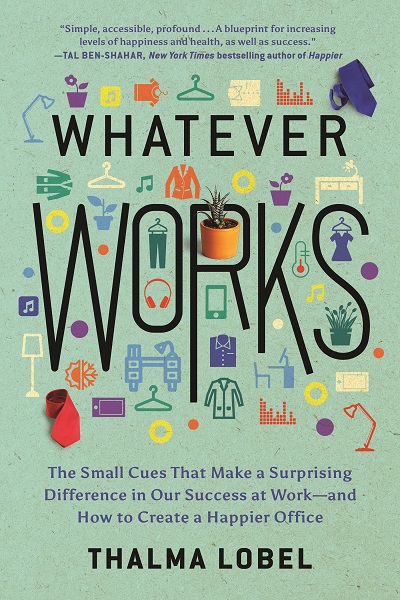
Whatever Works: The Small Cues that Make a Surprising Difference in Our Success at Work – and How to Create a Happier Office is a significant new book on a time-tested theme – one gaining additional layers of significance when considering the technological changes sweeping over the workplace over the last three decades and other unforeseen phenomena such as the COVID-19 pandemic. It is Thalma Lobel’s second book and she ample credentials to be tackling such a work. Her thorough understanding of human behavior and psychology helps her understand the agendas and motivations often dominating workplace behavior. She approaches making approvements with carefully considered yet decisive changes that encourage morale and empower individuals rather than singling them out for mediocrity or failure.
Each of the book’s fourteen chapters over the course of three parts begins with an epigram from an important historical figure in one area or another. Some are writers, some are business icons, all have shaped society in some meaningful way. Lobel takes on a scholarly tone during much of the book, but it isn’t the dry sort of lecture you anticipate from an academic. She keeps things warm and relaxed despite the obvious intellect powering her observations throughout the book and her penchant for occasionally speaking directly to the reader is an engaging device. It enlivens her already fine prose and makes the reading experience even more enjoyable as well as enlightening.
She throws a number of concepts the reader’s way during the course of Whatever Works but the book presupposes you have some familiarity with them already or else you wouldn’t be reading this book. It is true that, for the most part, Lobel intends this book to reach a niche audience rather than basking in a widespread popularity, but she underestimates her own work. You can market a book like this to the wider self-help genre in general rather than just business professionals because it discusses long-standing aspects of human nature we encounter multiple ways in our lives.
The preparation for this book likely loomed even larger than the writing. Lobel puts obviously countless hours curating relevant connections in other’s writing to her own ideas and the patchwork of her observations and those of others complement each other without ever striking readers’ as imitative. Lobel reached her conclusions through sheer intelligence, experience, and analyzing the work of her peers and contemporaries alike.
AMAZON: https://www.amazon.com/Whatever-Works-Surprising-Difference-Work_and/dp/1950665097
The sweat and late nights produced this book. Thalma Lobel’s second book Whatever Works: The Small Cues that Make a Surprising Difference in Our Success at Work – and How to Create a Happier Office is a bolder and more expansive effort than her fine first book about physical intelligence and she is well on her way towards establishing a reputation as one of the more informed theorists working with this subject matter today. Her rare gifts for drawing the right connections, her keen penetrating insights, and commitment to other human beings helps make Whatever Works: The Small Cues that Make a Surprising Difference in Our Success at Work – and How to Create a Happier Office an unique book.
Cyrus Rhodes



























